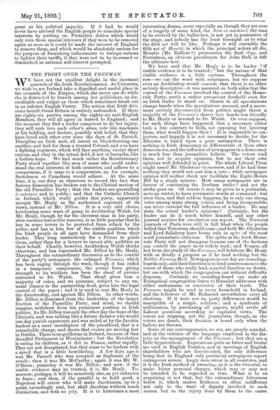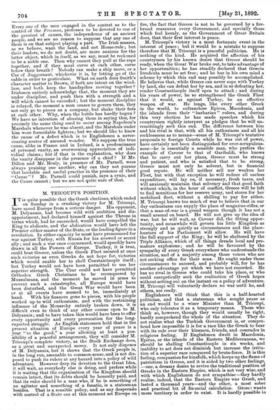THE FIGHT OVER THE FREEMAN.
WE have not the smallest delight in the incessant quarrels of the Irish Revolutionaries. As Unionists, we wish to see Ireland take a dignified and useful place in the counsels of the Empire, which she never can do while she is distracted by brawls among her politicians, as dis- creditable and vulgar as those which sometimes break out in an inferior English Vestry. The notion that Irish divi- sions benefit Great Britain is entirely unfounded. If there are eighty-six parties among the eighty-six anti-English Members, they will all agree in hatred to England; and the moment they find a leader competent to do her injury, they will rush into each other's arms, vote like machines at his bidding, and declare, possibly with belief, that they have loved each other ever since the days of St. Patrick. Discipline an Irish mob, all intent on blackthorning one another, and find for them a trusted Colonel, and you have a fighting regiment, which will face anything except short rations, and obey in the actual field, if not in barracks, like a forlorn-hope. We had much rather the Revolutionary Party stood together like men of sense who could under- stand the real interests of both countries, and adhere to a compromise, if it came to a compromise, as, for example, Scotchmen or Canadians would adhere. At the same time, it is our duty as observers to record the fact that furious dissension has broken out in the Clerical section of the old Parnellite Party ; that the leaders are quarrelling a outranee and in public ; and that the Catholic Church in Ireland, which really guides this party, apparently accepts Mr. Healy as the authorised exponent of its views, instead of Mr. Dillon. It is a very odd choice, betokening some want of grasp in Archbishop Walsh, for Mr. Healy, though by far the cleverest man in his party, stirs enemies into active rancour, is so little popular that he has in some towns to be protected from attack by the police, and has in him few of the visible qualities which the Irish people in all ages have demanded from their leader. They long instinctively for a Prince to guide them, rather than for a lawyer to invent able quibbles on their behalf. Clearly, however, Archbishop Walsh thinks otherwise, and has superseded Mr. Dillon by Mr. Healy. Throughout the extraordinary discussion as to the control of the party's newspaper, the enlarged Freeman, which has been raging through the week, though it has ended in a temporary compromise, the actual force giving strength to its wielders has been the sheaf of proxies entrusted to Dr. Walsh. That sheaf gives him a majority of votes, and we presume, subject to any un- usual clauses in the partnership deed, gives him the legal control of the paper ; and it is used to seat Mr. Healy in the directorship, and against Mr. Dillon. In other words, Mr. Dillon is dismissed from the leadership of the larger fraction of the Parnellite Party, and. must, we should imagine, withdraw from his prominent position in Irish politics. As Mr. Dillon was only the other day the hope of the Clericals, and was talking like a future dictator who would one day punish opponents, and was railed at by the Jacobin leaders as a mere mouthpiece of the priesthood, that is a remarkable change, and shows that events are moving fast in Dublin. There is no guillotine in Ireland, because of that dreadful Parliament in Westminster ; but the Revolution is eating its children, as it did in France, rather rapidly. They are not decapitated, but they cease to be leaders with a speed that is a little bewildering. A few days ago it was Mr. Parnell who was accepted as fugleman of the revolt ; then it was Mr. McCarthy ; again it was Mr. W. O'Brien ; yesterday it was Mr. Dillon ; and now, if the visible evidence may be trusted, it is Mr. Healy. To- morrow, perhaps, it will be somebody else, as yet unknown to fame; and then, if the parallel is to hold good, a Napoleon will arrive who will make Jacobinism, up to a point, exceedingly real, but shell Jacobins without much distinction, and with no pity. It is to historians a most interesting drama, more especially as, though they are sure of a tragedy of some kind, the dew ex mackind, the man to be evolved by the ballot-box, is not yet in possession of the stage, and nobody has the least foresight as to what the fifth act will be like. Perhaps it will resemble the fifth act of Hamlet, in which the principal actors all die, Horatio (Mr. Balfour ?) pronounces the final jive, and Fortinbras, an obvious pseudonym for John Bull, is left the ultimate heir.
We have said that Mr. Healy is to be leader "if visible evidence is to be trusted ; " but the nature of that visible evidence is a little curious. Throughout the row—we use the word with reluctance, but we suppose even an Archbishop would concede that there is no other so truly descriptive—it was assumed on both sides that the control of the Freeman involved the control of the Home- rule Party, surely a rather precarious foothold even for an Irish leader to stand on. Shares in all speculations change hands when the speculations succeed, and a move- ment entirely disconnected from politics might throw a majority of the Freeman's shares into hands less friendly to Mr. Healy or devoted to Dr. Walsh. Or even suppose, for such things have happened, that a necessary editor took a line contrary to both, not opposing but ignoring them, what would happen then ? It is impossible to con- jecture, and happily it is not necessary to decide, for the dilemma is based upon a pure assumption. There is nothing in Irish democracy to differentiate it from other democracies, and the influence of newspapers in a democracy is much less than journalists believe. The voters read them, not to acquire opinions, but to see their own opinions well defended in print. The whole Liberal Press might assail Mr. Gladstone to-morrow, and if he had done nothing they would not cost him a vote ; while newspaper opinion will neither check nor facilitate the Eight-Hours Bill by a single minute. How many newspapers are in favour of continuing the Durham strike ? and yet the strike goes on. Of course it may be given to a journalist, as to an orator, to have persuasive words at command ; but even then, and that seldom happens, he is only one strong voice among many strong voices, and being irresponsible, can never exercise the full influence of a leader. He may state the actual leader's opinions ? Certainly, but the leader can do it much better himself, and any other journal anxious for circulation can report. The Terrorist journals of Paris were still in full blast when the people willed that Terrorism should cease ; and both Mr. Gladstone and Lord Salisbury have borne rule in spite of the most acrid journalistic criticism. The splits in the Irish Home- rule Party will not disappear because one of the factions can control the paper most widely read ; and Teague, all hot from the study of the Freeman, will belabour Mr. Healy with as deadly a purpose as if he read nothing but the Dublin Evening Mail. Newspapers in our day are sounding- boards only, and their function is to lend sonorousness to the voices of those who really lead, a useful function no doubt, but one with which the congregation can without difficulty dispense. Certainly no sounding-board can make an Evangelical congregation listen to Ritualist addresses with either enthusiasm or conviction of their truth. The Freeman might be read in every household in Ireland, and the followers of Mr. Redmond nevertheless carry all elections. If it were not so, party differences would be susceptible of a simple solution ; and a syndicate of millionaires, by purchasing all papers, might settle all Labour questions according to capitalist views. The voters are reigning, not the journalists, though, as the voters are dumb, their decision is heard only when the ballots are thrown.
Some of our contemporaries, we see, are greatly scandal- ised at the violence of the language employed in the dis- pute on the management of the Freeman; but they are a little hypercritical. Expressions quite as bitter and brutal are used in English Vestries, and at meetings of English shareholders who are discontented, the only difference being that in England only provincial newspapers report outrageous scenes. Angry men swear in all countries, and it is the Irish method of swearing, as it is the Oriental, to make bitter personal charges, which may or may not be intended to be regarded as true. What is to us surprising is not that, but the extraordinary bitterness below it, which makes Irishmen so often indifferent not only to the want of dignity involved in such scenes, but to the injury done by them to the cause. Every one of the men engaged in the contest as to the control of the Freeman, professes to be devoted to one of the greatest of causes, the independence of an ancient people, and we see no reason to suppose that any one of them is on that subject playing a part. The Irish masses, as we believe, want the land, and not Home-rule ; but their leaders, we do not doubt, are more anxious for the latter object, which in itself, as we say, must be reckoned to be a noble one. Then why cannot they pull at the rope together, and if they must curse at each other, curse below their breath ? Nobody can make a ship move, or a Car of Juggernaut, whichever it is, by letting go of the cable in order to gesticulate. What on earth does Smith's character matter to Brown, if both are intent on the wind- lass, and both keep the handspikes moving together ? Irishmen entirely acknowledge that, the moment they are under discipline, and push then with a strength and a will which cannot be exceeded ; but the moment discipline is relaxed, the moment a man ceases to govern them, they not only go to pieces as a company, but shake their fists at each other. Why, when the battle has hardly begun ? We have no intention of abusing them in saying this, for precisely the same thing used to occur among Napoleon's Marshals whenever he was absent, and the Marshals under him were formidable fighters ; but we should like to know the cause of a defect which is to Englishmen a never- ceasing source of amused wonder. We suppose the true cause, alike in France and in Ireland, is a predominance of personal vanity, an overweening appreciation of indi- vidual claims ; but if that is the explanation, why does the vanity disappear in the presence of a chief ? If Mr. Dillon and Mr. Healy, in presence of Mr. Parnell, were always praising one another, why can they not pursue that laudable and useful practice in the presence of their " Cause " ? Mr. Parnell could punish, says a cynic, and the Cause cannot ; but we are not quite sure of that.



































 Previous page
Previous page